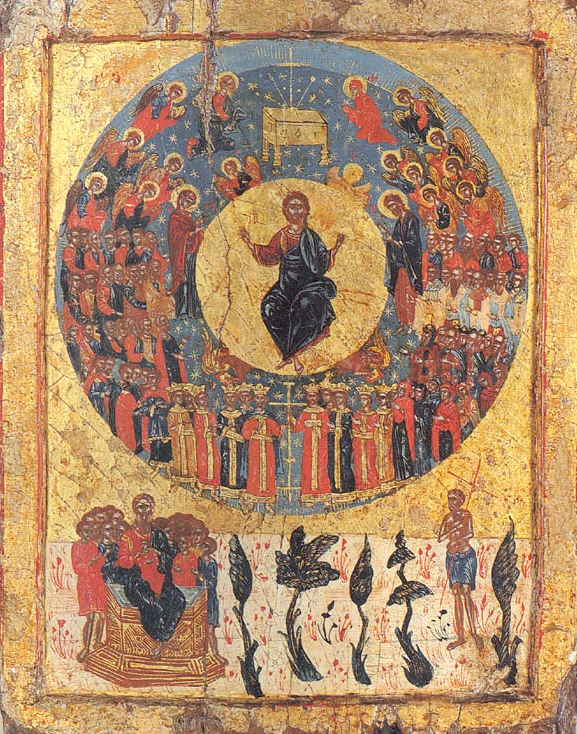Christian Art | Attempt To Stone Jesus | Law And Blasphemy
John 10: 31-42 – Lent Week 5, Friday (Audio Bible King James Version, KJV, Spoken Word)
31 Then the Jews took up stones again to stone him.
32 Jesus answered them, Many good works have I shewed you from my Father; for which of those works do ye stone me?
33 The Jews answered him, saying, For a good work we stone thee not; but for blasphemy; and because that thou, being a man, makest thyself God.
34 Jesus answered them, Is it not written in your law, I said, Ye are gods?
35 If he called them gods, unto whom the word of God came, and the scripture cannot be broken;
36 Say ye of him, whom the Father hath sanctified, and sent into the world, Thou blasphemest; because I said, I am the Son of God?
37 If I do not the works of my Father, believe me not.
38 But if I do, though ye believe not me, believe the works: that ye may know, and believe, that the Father is in me, and I in him.
39 Therefore they sought again to take him: but he escaped out of their hand,
40 And went away again beyond Jordan into the place where John at first baptized; and there he abode.
41 And many resorted unto him, and said, John did no miracle: but all things that John spake of this man were true.
42 And many believed on him there.
It is a tragedy that, as we approach Holy Week, the divisions between Jesus and his people the Jews become sharper, and what is more, that the Jews – a generic term in John’s Gospel for those Jewish people who have rejected Jesus Christ – seek to condemn Jesus in the name of God. By invoking the name of God, they are in fact rejecting Him. We see the Jews placing themselves in an impossible position. Nonetheless, Jesus patiently continues to reason with them, asking them to see and to believe.
Jesus quotes the Old Testament of the Bible when he says: ‘Is it not written in your law, I said, Ye are gods?’ (Cf. Psalm 82/81.) The Scriptures call us to become closer to God, as one with Him insofar as we can ever be able. If we can be called the sons of God, how much more does Jesus deserve to be known as the Son of God?
Jesus has come to fulfil the Scriptures. The whole of the Bible, the whole of human history, is centred upon him. Faced with the saving revelation of Christ, the Jews gather their stones. Their response is one of vicious barbarism. Just as many do today, when they impose barbaric punishments on other people, including stoning, so the Jews of Christ’s time refuse a future of love and cling instead to a past of hatred.
Jesus must have been desperate to save his people. He asks them to see the proofs of his divinity: to understand the words of Scripture and to consider the miracles which he has performed as signs. Jesus looks to a range of resources to try to save this people by helping them to see the truth. Their minds, however, are closed. They want death rather than the redeeming truth of salvation.
Jesus, then, returns to the place where he was baptized by John. This must have been to Jesus a place of great personal significance. This was where his ministry began. Perhaps he felt the need to recollect himself and summon his energies again, and perhaps to consider the impact he has made so far, while he anticipates Holy Week.
This passage of the Bible conveys to us a great deal of optimism despite the rejection of the Jews. Many people – many Jewish people – come to him and believe in him.
Through this Bible reading we are prepared for conflict and the refusal of belief, while also we are reminded of the faith of many, many people who have gone before us, including in this time of Christ.
‘He it is then who showed forth in himself alone all that he knew to be necessary to achieve our redemption – he who at the same time is priest and sacrifice, God and temple: the priest through whom we are reconciled, the sacrifice by which we are reconciled, the temple in which we are reconciled, the God to whom we are reconciled. He alone is priest, sacrifice and temple.’ St Fulgentius of Ruspe
![]()

Audio Bible KJV | King James Version | Endnotes
Why Do The Jews Reject Jesus?
In John 10:31-42, we see the Jews once again rejecting Jesus and accusing him of blasphemy. They demand that Jesus give them a clear answer about whether he is the Messiah or not, and Jesus responds by telling them that he has already given them proof of his identity through his works and miracles.
The psychology of the Jews who reject Jesus is complex, but one possible explanation is that they are so entrenched in their own religious beliefs and traditions that they are unable to recognize the truth when it is right in front of them. They are so focused on their own understanding of the law and their own expectations of what the Messiah should be like that they are unable to see Jesus for who he truly is.
Jesus’ retreat to the place where John baptized is significant because it highlights the contrast between the truth of baptism and the legalistic and false attitudes of the Jewish Temple authorities. Baptism represents a new beginning, a washing away of the old self and a rebirth into a new life in Christ. The legalism of the Jewish leaders, on the other hand, represents a rigid adherence to the letter of the law without any real understanding of its true meaning.
This contrast is important because it shows us that true faith is not about rigid adherence to rules and regulations, but about a personal relationship with Christ that transforms us from the inside out. It is about recognizing the truth when it is presented to us, even if it challenges our preconceived notions and beliefs.
As Catholic theologian Thomas Merton once wrote: ‘The great task is to discover the truth in the midst of our own thoughts, our own prejudices, our own conditionings. And to do this we must have a certain openness, a certain receptivity to the truth, which means, in fact, a willingness to accept whatever the truth is.’
In Protestant theology, there is a similar emphasis on the importance of being open to the truth and being willing to let go of our own preconceptions and beliefs in order to follow Christ. This requires humility, a willingness to admit our own limitations and to seek guidance from God and others.
John 10:31-42 challenges us to examine our own beliefs and attitudes and to be open to the truth, even if it challenges our preconceptions. It reminds us that true faith is not about rigid adherence to rules and regulations, but about a personal relationship with Christ that transforms us from the inside out. As we reflect on this passage during the season of Lent, may we be inspired to let go of our own preconceptions and to be open to the truth, guided by the Holy Spirit and the example of Christ.








